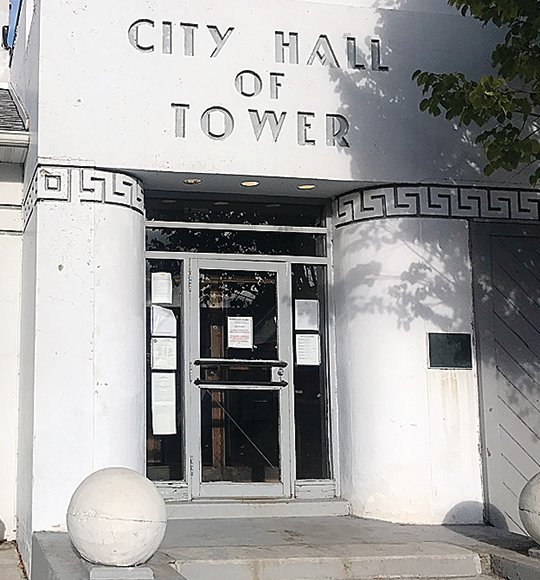Support the Timberjay by making a donation.
City OKs bonds for public works purchase
TOWER— The city council here approved the funding package that will enable the city to acquire the St. Louis County public works facility on Marina Drive, for $260,000. Dan Tienter, of Ehlers …
This item is available in full to subscribers.
Attention subscribers
To continue reading, you will need to either log in to your subscriber account, below, or purchase a new subscription.
Please log in to continue |
City OKs bonds for public works purchase
TOWER— The city council here approved the funding package that will enable the city to acquire the St. Louis County public works facility on Marina Drive, for $260,000.
Dan Tienter, of Ehlers Financial, which is handling the $283,000 general obligation bond issue offered a brief presentation on the process. He noted that Frandsen Bank and Trust had agreed to purchase the ten-year bonds at an interest rate of 5.3 percent.
The bond is expected to close later this month, with the funds available to the city as of June 20. The bond amount is higher than the purchase price of the facility, which covers the cost of issuing the bond and the cost of capitalized interest.
As part of the bond, the city agrees to include the annual repayment amount, averaging about $38,000, in its yearly levy. While that would tend to increase the city’s levy, the city won’t be levying in the future for repayment on a $250,000 emergency loan the city took out in 2019 to address a critical cash flow crunch from years of questionable financial management at the city. “My understanding is that the city has about $53,000 in its tax levy to apply to those payments,” said Tienter. That loan is fully retired this year so it won’t be part of the city’s levy calculations in the future. “One of the pieces of information that we received from Michael [Schultz] is that the council really wanted to stay below that $53,000 mark. So, what I would imagine happening given the instruction today is you would just reduce your levy by the difference between those two debt service payments,” Tienter added.
Over the course of the next ten years, the city will pay out just over $372,000 to retire the principal and interest on the bond according to a sale summary prepared by Tienter. He said the bond agreement provides for flexibility allowing the city to pay off the bonds early or refinance should interest rates improve enough to justify the time and expense of doing so.
Background on
the purchase
The decision to purchase the facility began with informal discussion three years ago and was ultimately made possible by the county’s decision to consolidate its public works staff into a new facility built in Kugler Township last year.
An ad hoc committee of city officials had investigated the issue earlier this year and recommended that the city purchase the 31-acre site, which includes a 3.6-acre parking lot, a 4,700-sq. ft. office and maintenance garage, a 3,500-sq. ft. cold storage building, and a 10,200-sq.ft. salt dome with thousands of yards of salted gravel. The maintenance facility includes a built-in crane and a long list of other equipment which the county plans to leave.
The purchase will allow the city to consolidate its public works equipment and operations at a single location and will provide a significant amount of equipment that city staff will be able to use. City officials say they plan to lease out all or portions of two current cold storage garages and, possibly, one heated garage located at city hall, to help cover the cost of the acquisition.
Local housing
trust fund
The council also gave the first reading of an ordinance establishing a local housing trust fund. The proposal, advanced by council member Joe Morin, would qualify the city to apply for state matching funds. He is proposing that TEDA make the initial contribution to the fund and determine uses for the money, which would be geared toward housing related programs. “How we use the money does not have to be determined right away,” Morin told the council. He noted that most cities that establish such trust funds are much larger than Tower, and often have millions of dollars in such funds, which they can use to match outside funding designated for housing programs or projects. Tower’s program would likely be more limited in scope given the financial limitations of the small community.






